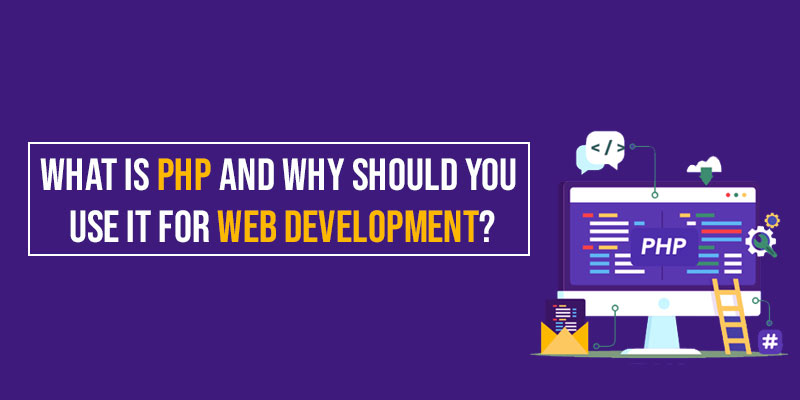PHP is one of the most popular languages among programmers and web developers, with 79.2% of all websites designed using this programming language. WordPress, Facebook, Wikipedia, and Zoom are well-known websites and online services that employ PHP. What advantages does PHP provide for building better websites? Let's continue to read.
An open-source programming language frequently used for web applications is PHP. PHP is now a recursive abbreviation for "hypertext preprocessor," even though its initial meaning was "personal home page" but chances are you won't ever hear that term again.
In its simplest form, PHP is a server-side scripting language that is integrated into HTML. PHP enables database interaction and dynamic content creation for websites. PHP is renowned for its efficiency, reliability, and flexibility aspects that have entrenched its status as a staple in the web development industry.
In this blog, we shall discuss what is PHP, the benefits of PHP programming language, what is web developing, PHP development tools and uses of PHP in web development.
To become a PHP developer, you can join a PHP Training in Chennai and learn Creating, Managing and Mastering MySQL, Control Structures of PHP and developing Web Applications using PHP.
What is PHP and Uses of PHP in Web Development
Like any other scripting language, PHP is the technology you use to create a connection to your database, retrieve data, and then provide relevant data to your web server for HTML display. However, PHP stands out from other languages in several ways.
- A Scripting Language: Runtime interpretation of scripting languages is performed by another software. Server-side or client-side interpretation is possible for scripting languages (in the browser).
- Server-Side: PHP is a server-side scripting language handled on a web server by a Php script; the output is then transmitted to the web browser as plain HTML.
- Open-Source: PHP is free to download and operate.
- Object-Oriented: To create more intricate, scalable web applications, object-oriented programming uses the principle of "objects" to hold data and functionalities. OOP was incorporated into PHP5.
- Fast: PHP takes advantage of its memory to improve performance and reduce server load. Compared to Ruby and Python, PHP can be the faster threshold.
- Simple: Whether you're just starting out, using pre-existing frameworks, or incorporating new ones, the PHP syntax is simple to comprehend and understand.
- Well Supported: PHP is compatible with many hosts and handles all popular databases (MySQL, SQLite, and ODBC) (Apache, IIS, etc.). It can run on any operating system, including Windows, Mac OS, Linux, etc., and is further supported by several extensive and tested libraries as well as PHP frameworks like Laravel, CodeIgniter and Symfony.
Eight different data types are used to create variables in PHP, a flexibly typed language (which stores data of different types). PHP is quite permissive of variables, processing, and assuming the data type, in contrast to other programming languages.
Although they can be given any name that starts with a letter, all variables begin with a dollar symbol ($).
Variables in PHP are not "strong" or "weak," in contrast to those in many other programming languages. Compared to this, PHP is dynamic and allows the usage of strong or weakly typed variables, indicating how rigidly or flexibly the conversion occurs.
If you want to learn a programming language, You can join a Python Course in Salem and learn the core concepts of python, such as frameworks, tools, strings, Python Identifiers, Keywords and Indentation, etc.
What tools does PHP use?
You may greatly improve your development process by using PHP tools. In PHP, various libraries and classes assist with various tasks, including coding, testing, benchmarking, and debugging.
How can PHP help you?
With competitors like JavaScript seeking to replace it, many of us have asked, "Is PHP Dead?" for more than ten years. PHP has steadily maintained its position as the foundation of 80 per cent of the overall websites throughout the years developed using PHP. This is proof that PHP is here to stay. We shall discuss the perfect explanation below.
Despite being a more established programming language with functionality than more recent ones, PHP has kept up with the times. This evolution has brought PHP to a more mature state, where it is well-supported, well-documented, and simple to use.
With the ability to set up on any Linux, Windows, or Unix OS, PHP developers have a diverse range of frameworks, databases, and libraries to help their task. Most web hosting companies support PHP, and in terms of price, PHP frequently wins out in terms of development time and total operating and maintenance costs. PHP, an effective language, can provide the high-performance rates that today's consumers require.
Due to its extensive API documentation, PHP sometimes shows up first when you are planning the development of a product. All CMS applications and add-ons may seamlessly integrate into your PHP-based website to produce dynamic, interactive, feature-rich experiences.
- Flexible
- Scalable
- High-Performing
- Secure
- Affordable
- Compatible
- Well-Supported
- Easy to Maintain
PHP becomes faster with every new release. PHP's latest version is 8.2, the most recent release of PHP. Join the PHP Course Online, which is meticulously designed for learners who intend to learn from the comfort of their homes.
Examples of Websites using PHP
PHP is a programming language that may be utilized to create dynamic and interactive web pages, programmes, and eCommerce platforms. PHP is a good choice for many web operations, including creating dynamic web pages, sending emails, compiling web forms, and transferring and receiving cookies.
PHP is a solid base for building web applications such as content management systems (CMS), bespoke databases, eCommerce websites, mobile apps, and social portals since it can save, delete, and edit data stored in a database.
PHP offers outstanding productive capacity when creating a digital product experience that improves consumer relationships for your company and gives you a competitive edge. Let's look at some real-world applications of PHP.
Facebook
Facebook utilises a customised version of PHP called HipHop Virtual Machine (HHVM), which has led to improvements trickling down into PHP itself. 2.96 billion monthly active users use Facebook each month.
Wikipedia
Nothing gets updated more frequently than Wikipedia and it is supported by PHP because of its reliability and scalability.
Mailchimp
Using PHP as its backbone, Mailchimp supports over 13 million customers and holds 60.52% of the email market.
Yahoo!
The Yahoo search engine and news portal migrated to PHP in 2002 from a closed-source C/C++ system to cut expenses and allow growth. Around 225 million active monthly users use yahoo.
Canva
Canva has experienced explosive growth in recent years and now offers a simple photo editor with templates for making graphics for the web or print. The well-known design platform now has ten million users across 179 nations.
Slack
Slack has clarified that the server-side application functionality is written in PHP. And Slack is not just simply a website; it is a full-featured communications channel that Salesforce recently acquired for $27.7 billion.
Join the Python Course in Coimbatore and learn basic to advanced concepts of python, such as introduction To Python, Lists, Ranges & Tuples In Python, Python Dictionaries And Sets, and Input and Output In Python.
Examples of Content Management Systems (CMS) Using PHP
A Content Management System (CMS) is an online software tool that enables non-technical individuals to produce and maintain digital content. A system that enables you to create and administer your website without having any prior understanding of HTML is the most prevalent example of a CMS. Other CMS, such as online photo albums or document sharing, concentrate on asset management.
Today, most content management systems (CMS) use PHP, including prominent platforms like WordPress, Drupal, Magento, and Joomla. Developers can use these CMS platforms and add-ons as a PHP architecture to create affordable eCommerce platforms and websites.
With 76 million active websites and 76.5% of the CMS industry, WordPress is likely the most well-known PHP CMS. WordPress may be used to create websites of any complexity, from simple blogs to extensive online businesses.
Here are the most popular brands that use WordPress:
- BBC America
- Sony Music
- The New Yorker
- Tech Crunch
- The Walt Disney Company
If you want to get into the web development field, you can join a Web Designing Course in Coimbatore, which is meticulously designed for Coimbatore- based students who are intrigued about starting their careers as web developers.
PHP and the LAMP Stack
A "LAMP" stack is a collection of open-source applications that may be installed simultaneously; it functions as a service bundle and frequently includes PHP as a key component. The following are components of the LAMP stack:
- (L) Linux, the operating system
- (A) Apache, the webserver
- (M) MySQL, the database
- (P) PHP
- Programming language
Even though components can be used interchangeably, the LAMP stack, which includes PHP, continues to dominate the web development business. For instance, despite the MEAN bundle's expansion (MongoDB, Express.js, AngularJS, and Node.js) with JavaScript, the MEAN stack is best suited to a select few applications, typically those where flexibility or efficiency is of utmost importance.
PHP Application Development
Since PHP is a friendly language, many developers can help you get started. You can use a variety of outstanding PHP frameworks (such as Symfony, Laravel, Aura, and CodeIgnitor) as well as CMS systems (such as Drupal and WordPress) for developing PHP web applications. Unfortunately, a large part of people's "dislike" of PHP stems from the prevalence of incorrect code. PHP's worst users should not be used as a standard.
Your client's demand and are entitled to a quick, simple, and feature-rich experience. You, therefore, need a reliable PHP web development partner. So, choose a skilled core PHP and CMS team to create and deliver specialised websites, eCommerce stores, apps, and portals that aid organisations in quickly scaling and maintaining their future-proofed.
If you want to become a web developer, you can join a Web Designing Course in Chennai and learn elements of the HTML document, Website vs Webpage, Manage the Texts in the HTML and HTML Styles.
Why use PHP IDEs?
A PHP IDE contains features that encourage PHP development in addition to syntax highlighting and other tools found in a PHP editor. You can often find primed code templates and complete projects in the finest PHP IDEs.
Most of us desire to write clean code, work harder, and make fewer mistakes. Of course, it is entirely up to you, but in most cases, integrated development environments (IDEs) can help you more quickly achieve those goals. Because there are so many things to consider, selecting the ideal IDE might be complex. And almost every IDE website claims to be the best.
The following pointers will help you decide:
- Code completion
- Debugging
- Client-side features
Now that you have understood what is PHP, the uses of PHP programming language, PHP development tools and the uses of PHP in web development. So, if you want to become a PHP developer, you can join the PHP Course in Bangalore and learn how to develop a website and its applications.


